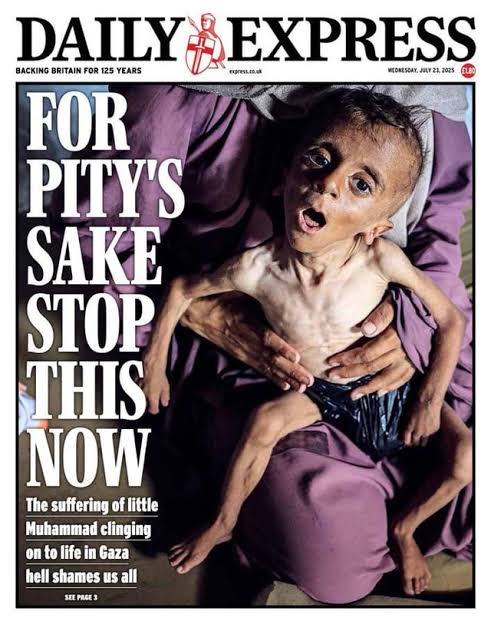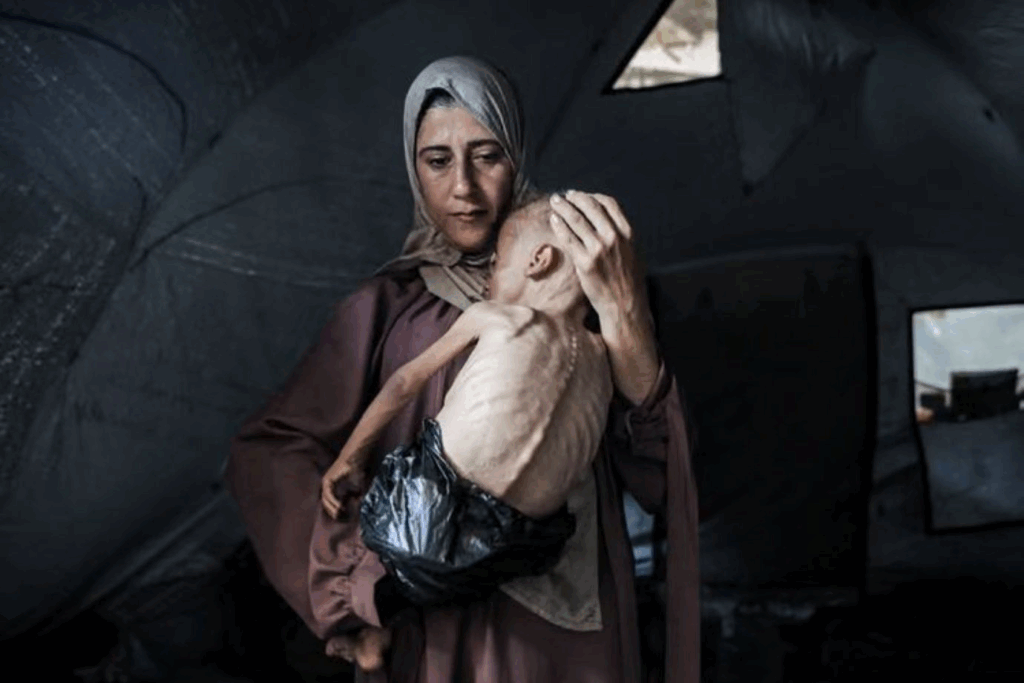I’ve held back from writing about Gaza for a long time. As a Lebanese Australian woman, my heart carries layers of grief, complexity and conflict when it comes to the Middle East. But silence is no longer an option. And it should not be for you either.
This week, the usually conservative Daily Express in the UK ran a front page image that shattered me. It showed 18-month-old Mohammed Zakariya Ayyub al-Matouk, a baby boy reduced to skin and bones, his spine and shoulder blades protruding through paper-thin skin. He wore a plastic bag as a nappy, not out of neglect, but because his mother had no access to basic supplies. No formula. No medicine. No food. The tent they live in, described by the photographer Ahmed al-Arini, resembled a tomb bare except for a small oven. The heading: “FOR PITY’S SAKE STOP THIS NOW”.

Then I saw another image. A mother, gaunt and hollow-eyed, cradling her child Muhammad in her arms. The child had dropped from nine kilograms to just six. His tiny body limp, his head supported by his mother’s frail hand. Her face tells a story of despair, of love, of helplessness. These are not just photos. They are cries for help. They are proof of a world that has lost its way. We have lost all sense of humanity. As a mother, these images broke me. They broke my heart, my spirit and my silence.
I grew up witnessing Lebanon torn apart by war. Its cities scarred, its people displaced, its spirit tested. Like so many Lebanese expats, my family and I have spent years sending money, medicine, and whatever hope we could muster to support loved ones and communities back home. But what we are seeing unfold in Gaza is something even more devastating. It is not just war, it is the systematic starvation of a people. It is the slow, deliberate erasure of life. This is not just a humanitarian crisis—it is a collapse of humanity itself. The deliberate starvation of children should be the moment that shakes every conscience into action. This is not about politics. It’s not about choosing sides in a conflict. It’s about choosing decency, dignity and the right of every child to live.
And yet where is the world’s response? Where is the unified, coordinated global effort to say ‘enough’? Where is the moral outrage that should be echoing from every parliament, every newsroom, every home? Where is the action?
Yes, world leaders, including Australia, have issued statements condemning the atrocities. But words without action are hollow. They mean nothing. They do not feed a child. They do not heal a wound. They do not shelter a family. A joint letter signed by over 100 non-government organisations this week declared: “Children starve while waiting for promises that never arrive.”
We have stood by for nearly two years watching this unfold. And now we act surprised? How can we be?
I am a mother of three. I have nieces, nephews and cousins. I watch all these children in my life whom l adore laugh, cry and sleep peacefully in their beds. I watch them grow, learn and dream. That safety, that nourishment, that peace – it should not be a luxury. It should be the basic right of every child in this world.
It is 2025. If we, as a global community, cannot stand up and say enough—enough is enough—then we have truly lost our moral compass. If we cannot come together to ensure that children, the most innocent among us, have access to food, clean water and basic medical care, then what are we even doing here?
What is the point of our institutions, our diplomacy, our wealth, our technology if we cannot protect a starving child? This is not a question of resources. It is a question of will. Of conscience. Of whether we are still capable of collective empathy in a world that seems to be growing colder by the day.
Because if we can look at these images, hear these stories and still do nothing then we are complicit. And history will remember our silence.

